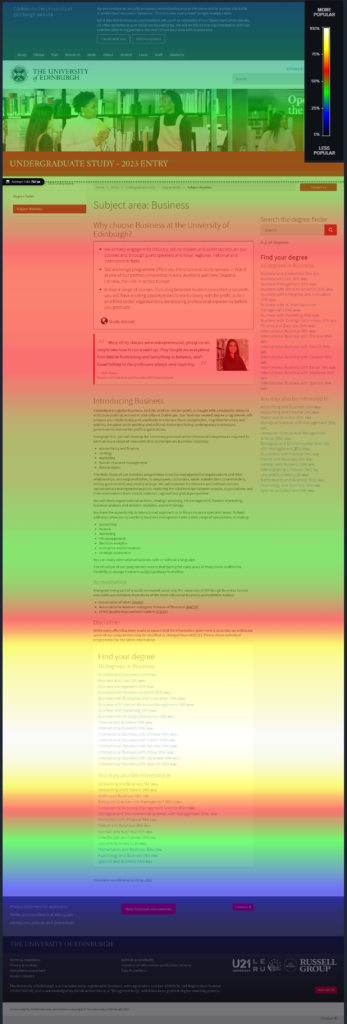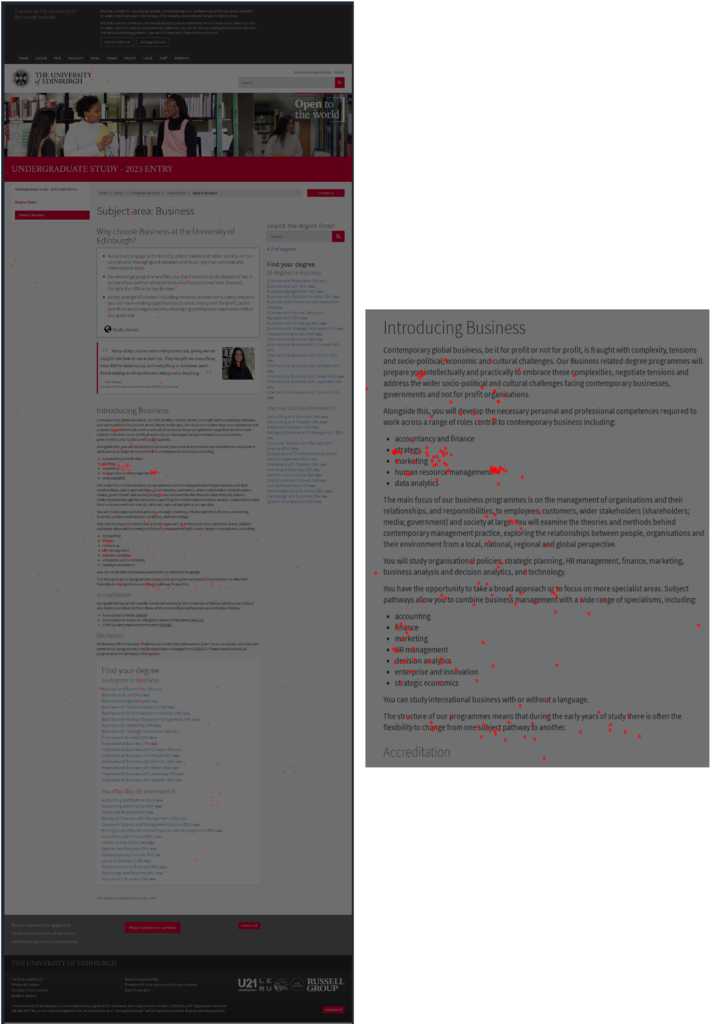Why we are removing content from subject area pages
I have done research on the usage of subject area pages on the current degree finder, which shows that users spend a short amount of time on these pages looking for a link to the programme entries and don’t engage with any other content. Due to this, we are moving this subject area specific content to the programme entries.
Background
We are currently running a three-year project to deliver the future of prospective undergraduate online provision.
Learn more about our degree finder project in Neil’s post
The information presented in the degree finders is of great importance to prospective students. The number of visits to the degree finders highlights this – the degree finders only account for 2% of the University’s central web estate, yet they receive 20% of the visits.
How people currently use the undergraduate degree finder
From our user research, we know that undergraduate prospective students use aggregator websites to look for information on what they can study. These provide the ability to compare programme information across different universities and, for University of Edinburgh degrees, link to the programme entries on the University’s website.
Currently, one quarter of the visits to undergraduate programme entries come from these third-party referrals or directly from a search engine. The rest are from searches on the University website. There are four ways to search for a programme entry on the undergraduate degree finder, by:
- subject area
- a-z of degrees
- college or school
- using the search box
Over half of these searches (53%) are done by subject area since this is the default when entering the degree finder. The subject area search takes the user to a subject area page that is divided into the following content:
- why choose this subject area at the University of Edinburgh?
- introducing the subject area
- find your degree (links to programme entries)
- you may also be interested in (other related programmes)
The information found in the first two sections of a subject area page is not presented in the programme entries. This means that prospective students coming from referral sites or search engines are not presented with this additional information on their subject area.
Our research on the use of subject area pages
We conducted quantitative research into the usage of the subject area pages of the most visited subjects in 2022:
- Business
- Engineering
- Computer Science
- Law
Data from this research shows that users spend, on average, 30 seconds on the subject area pages. This is just enough time to glimpse at the introductory information found in “Why choose this subject area at the University of Edinburgh?”, but users largely bypass this and the “Introducing” section on their way to the degree listings.
Additionally, rage click data – repeat clicks on an element, suggesting it is not performing the way visitors expect – shows that users expect the links to programme entries to be higher up on the page.
Future of subject area content
This research shows that the written content on subject area pages is not being viewed. Visitors are looking for a relevant link to take them to the programme they want to learn more about. As such, in the future degree finder we will remove these content areas from the subject pages:
- why choose this subject area at the University of Edinburgh?
- introducing the subject area
To ensure that prospective students get to see useful information on the subject area of their preferred degree, this content will now be found in the programme entries. This also reduces the need for prospective students to navigate the website when looking for information.
Further research is needed to decide the future of the subject area pages. We can keep the subject area pages as a listing of programmes in each subject. Alternatively, we can remove the subject area pages entirely and rely on filters in the search interface to narrow down the list of programmes under a particular subject.
Learn more
I have done previous research on this project to help support our content prioritisation and decision-making. Learn more about analytics done on this project in my earlier post.
Using website analytics to understand prospective undergraduate student’s behaviour






Thanks Carla, good post.
Thanks Carla, this is very useful I wonder if it also translates into individual School’s pages? Should I move Why Study Engineering into individual programmes pages rather than having it on the subject page?
Hi Ala, thanks for your comment! I cannot say for certain that this translates exactly to the Engineering website as users can have different goals and behaviours for each site. But, I would say that, if you were trying to remove pages from your site, it’s something worth exploring.